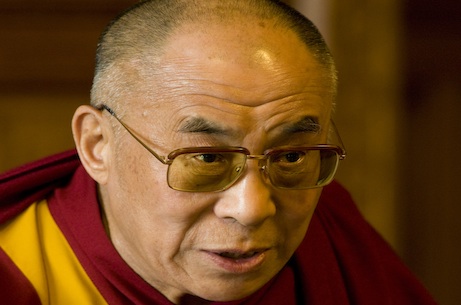
His Holiness the Dalai Lama returns to Cambridge in April to speak at the Global Scholars Symposium.
His Holiness the 14th Dalai Lama of Tibet will be visiting Cambridge on April 19 and 20 to speak at the Global Scholars Symposium.
Founded in 2008 by Gates Cambridge Scholars, the Global Scholars Symposium (GSS) brings together the world’s leading scholars studying on Rhodes, Marshall, Fulbright, Churchill, Chevening, Clarendon, Weidenfeld, Commonwealth and Gates Cambridge scholarships in the United Kingdom.
Across three days of keynote speeches, debates, and interdisciplinary workshops it aims to engage and inspire scholars to face the world’s most important global challenges.
The Global Scholars Symposium was brought back to Cambridge this year by Gates Scholars after two years at Oxford hosted by the Rhodes House. Three Gates Scholars (Elizabeth Dzeng 2007, Brianne Kent 2011, Toby Norman 2011) make up the executive team with a Rhodes Scholar and Clarendon Scholar, working with directors and organising committee members across all nine scholarships. The theme of the 2013 Global Scholars Symposium is “The Next 30 Years: Bridging Ideas to Action” and focuses on how Scholars can bridge the ideas of today to action for tomorrow and use their careers to make positive changes in the world.
At the symposium the Dalai Lama will speak about “Non-Violence for Conflict Resoultion”. His Holiness will guide a conversation with Scholars about how to inspire nonviolent resolutions to major conflicts.
His Holiness is keeping the tradition of visiting Cambridge every 20 years. In 2012 his religious translator Ven Ngawang Sonam, visited Cambridge to give an address to the Gates Cambridge Scholars, and has since been working with scholar Cameron Taylor (2009) to make this event possible.
Other speakers include Nobel Prize winner Professor Sydney Brenner (South Africa), Timothy Costello (Australia), His Excellency Gordon Campbell (Canada), Judge Goodwin Liu (USA), Professor Cindi Katz (USA), Wanjira Mathai (Kenya), Wes Moore (USA), and several other world-renowned leaders.
Brianne Kent said: “We are absolutely delighted to host the Dalai Lama in Cambridge. We hope that his talk will provide a platform to motivate scholars to use their careers to help reduce violence and promote peace around the world. We are also thrilled to have the Symposium back in Cambridge once again and are looking forward to an inspiring weekend of talks and workshops with some of the world’s leading activists and thinkers.”
The event would not have been possible without the generous support of The McCall MacBain Foundation. For more information about the Global Scholars Symposium please see globalscholars.co.uk.












